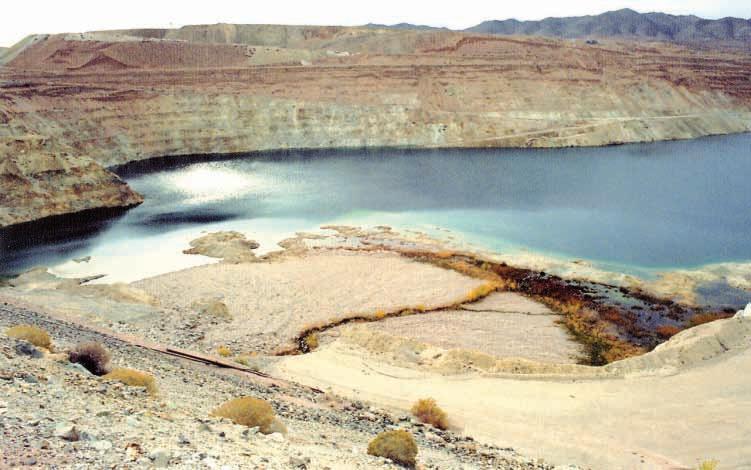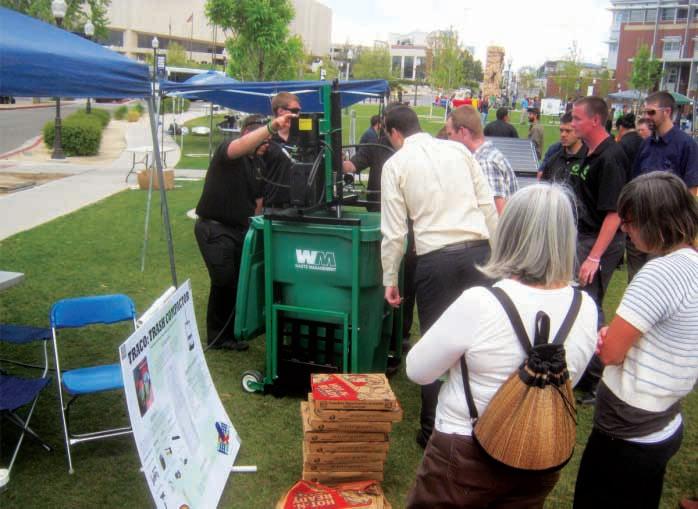
8 minute read
news
from May 16, 2013
Bused and abandoned
The Centers for Medicare and Medicaid Services, an agency of the U.S. Department of Health and Human Services, is stepping up its scrutiny of Nevada busing of mental patients out of state.
Advertisement
The Centers had earlier given the Sandoval administration until May 6 to provide evidence that it has corrected what the agency calls “serious deficiencies” in the operation of RawsonNeal Psychiatric Hospital or lose millions of dollars in federal funding.
Whatever the state then submitted was apparently not enough. The agency has now launched a second probe of Nevada’s practices at the hospital.
Last month the Sacramento Bee reported that Nevada bused up to 1,500 patients to cities around the nation, including at least 200 in Los Angeles County, 70 in San Diego County, and 19 in Sacramento. Half a dozen local and federal agencies have launched investigations.
School proposal makes splash
Former Nevada schools superintendent James Guthrie, who may have been forced out of his job by Gov. Brian Sandoval, is getting wide attention for his notion that some Nevada teachers get pay raises.
And as a result, the problems of Nevada education are also getting wide attention.
In an essay for the Nevada Research Policy Institute, Guthrie proposed that Nevada pay the top 10 percent of Nevada’s teachers an annual salary of $200,000, thus attracting better candidates for teaching positions.
Guthrie described the idea as a quick fix for the state’s schools problems: “A cadre of $200K classroom teachers would have an overall price tag for taxpayers far lower than the incremental school improvement ideas currently being contemplated, such as lowering class size or new add-on programs to ensure students can read by the third grade.”
The Nevada State Education Association responded, “There is no ‘silver bullet’ that will fix Nevada’s education system, as the report boasts. Of course we need a way to attract the best and brightest to our profession, but choosing a small percentage of teachers and lavishing them with high salaries would, as the report suggests, capture attention, but do little more.”
When Adam Taylor of Business Insider described Guthrie’s proposals, he wrote, “Nevada education may well need rescuing. A 2013 report from Education Week found that the state’s high school graduation rate was just 59.2 percent—the lowest in the country. When 24/7 Wall Street compiled the data ... it ranked Nevada’s public education system second ‘worst’ in the country.”
Guthrie appears to be preparing for a Michelle Rhee-like role in his career. He is reportedly planning to release a national plan for education.
He was appointed school superintendent by Sandoval in 2011 after the Nevada Legislature switched the appointment power from the state school board to the governor. (Contrary to some published reports, he is not the state’s first appointed school superintendent. That honor goes to John Bray in 1910.) The two men had public differences and Guthrie finally departed.
Trade alert
A report last week in the New York Daily News said Nevada brothels are “in danger of extinction” because of a poor economy and freelance competition from streetwalkers.
“When I started as the lobbyist for the industry in 1985, we had 37 brothels in the state,” Reno wedding chapel owner George Flint told the newspaper. “Now we have just 18, and 12 to 14 of them are not doing very well.”
—Dennis Myers
Keeping the lines straight
Strategic blunders, legal obfuscation slow mining tax debate
Mixed signals and uncertain legal opinions have been clouding the processing by of Senate Joint Resolution 15, which Dennis Myers seeks to remove special treatment given to mining over other industries in Nevada. The resolution, if approved by the lawmakers and then by voters in 2014, would remove language in the Nevada Constitution that caps mining taxes. No other industry enjoys such a cap. Nevada is the nation’s principal gold mining state, and nearly all the gold mining corporations are based in Canada, with the result that huge amounts of
James Wadhams Mining lobbyist
capital leave the state and the nation, with only token amounts of taxation paid to either the U.S. or Nevadans.
The state constitution limits taxation of mines to net proceeds and caps them at 5 percent—after miscellaneous expenses are deducted. The deductions and their breadth have also been a source of controversy.
In 2010, 5.3 million ounces of gold and silver with a value of $6,642,609,597 were taken from Nevada (that was 73 percent of all gold mined in the United States), with just 1.2 percent of that amount paid in state taxes.
In that year, mining paid $76,847,872 in taxes to the state. That’s $591,520,123 less than the $668,367,995 paid by the state’s casinos, which have one of the lowest gambling tax rates in the nation.
Most supporters of SJR 15 had hoped their fellow supporters would avoid talk of tax hikes, which are not the purpose of the constitutional amendment, and would focus instead on fairness among industries. SJR 15 does not raise taxes, it merely puts mining on the same footing as other businesses by removing its preferential tax status.
What the level of mining taxes should be, said SJR 15 backer Guy Louis Rocha, is a question for another day. He said the more important issue now is repealing the industry‘s special treatment, which is a relic of the century before last.
“This language went into the constitution in 1864 when mining was considered the state’s ‘paramount industry.’ That is no longer true,” he said. “The legislators should have to treat every industry the same.”
But some supporters of the change let themselves be drawn into discussions of subsequent tax hikes on mining that would become possible in future legislatures. Service Employees International Union lobbyist Mayra Ocampa, for instance, was quoted by the Las Vegas Sun: “We are asking big business to pay their fair share, including mining.”
There has been talk of reopening the Anaconda mine pit in Lyon County. The pit is currently on the federal Superfund list as a site needing funding for a cleanup.
Off topic
Meanwhile, industry lobbyists tried to keep legislators’ minds off the fairness issue by claiming the state would suffer a loss of revenue if SJR 15 was approved by voters in 2014—a claim previously used in 2011.
Mining lobbyist Tim Crowley said last month that approval of the constitutional amendment “will halt revenue to the state,” create money problems for local governments, and create instability in the economy.
Except for those allied with the industry, no lawyer has testified in support of that notion. All have said Crowley is wrong, that the legislature’s taxing authority, located elsewhere in the constitution, would be unaffected by SJR 15. But some lawmakers say the argument is influencing them. Still other lawmakers were insulted that the industry would try what they consider a transparently deceptive argument—though they conceded that the tactic had succeeded in diverting attention from the fairness issue.
Some critics seemed to suggest that if any legislators are confused by the legal argument, it’s because they want to be. “This is not a doubtful or unsettled question,” said a lobbyist for another industry. “Everyone, including mining, knows they’re just blowing smoke.” (When asked if mining would sue the state if SJR 15 passed, Crowley ducked the question.)
Last month, Assemblymember John Ellison said, “If they change this, and we lose the net proceeds going to all these counties, we’re in big trouble. … If they do get this formula changed, the state’s going to lose money, and the counties and cities are going to lose money.”
Actually, votes in the 2014 election would be cast and counted on Nov. 5, 2014, just 90 days before the 2015 legislature goes into session on Feb. 2, 2015. And the results of the election will not take legal effect until certified by the Supreme Court on Nov. 25, just 70 days before the legislature will begin. So even if Crowley’s claim was correct, any lapse of taxation of the industry would be brief.
Journalist Michael Kinsley has defined a gaffe as someone accidentally telling the truth. In that sense, mining lobbyist James Wadhams may have committed a gaffe during all the disputes over the meaning of the existing constitutional language. He said during testimony before a Senate committee, “If passed, mining will be treated like all other property owners.”
The lawmakers were more receptive to testimony from legislators and local officials who represented mining areas. Elko City Councilmember Richard Perry said enactment of SJR 15 could lead to “uncertainty in the natural resource industry, one of the few bright spots in our state’s economy and the primary source of jobs in Elko.”
That led one legislator to say that the value of precious minerals is highest when times are bad, so that’s when the state has to get taxes from mining.
If the measure does not win approval in this Legislature, the long amending process would have to begin again, or be dropped altogether.
It is widely assumed that if the measure passes the Legislature, stopping it on the ballot will be extremely difficult. Even Sen. Pete Goicoechea, a Republican representing part or all of five small counties—plus part of urban Clark County—has said he expects the measure to be approved by voters.
SJR 15, which was approved by the 2011 legislature, must be approved again this year. The Senate has done so and its fate is now in the hands of the Assembly, at least 38 of whose 62 members have accepted money from the industry.
Republicans at the two ends of the legislative building disagree on the issue. Senate Republicans mostly support SJR 15. Assembly Republicans oppose it.
The mining tax change is opposed by Gov. Brian Sandoval, but he has no power to veto it. Under the Nevada Constitution, governors are excluded from the amending process. Ω
Guy Louis Rocha Historian
Going modern

On the University of Nevada, Reno campus last week, a device to compress trash in outdoor trash receptacles was demonstrated. A couple of dozen mechanical engineering students displayed such “capstone” class projects—inventions created for their final class.










